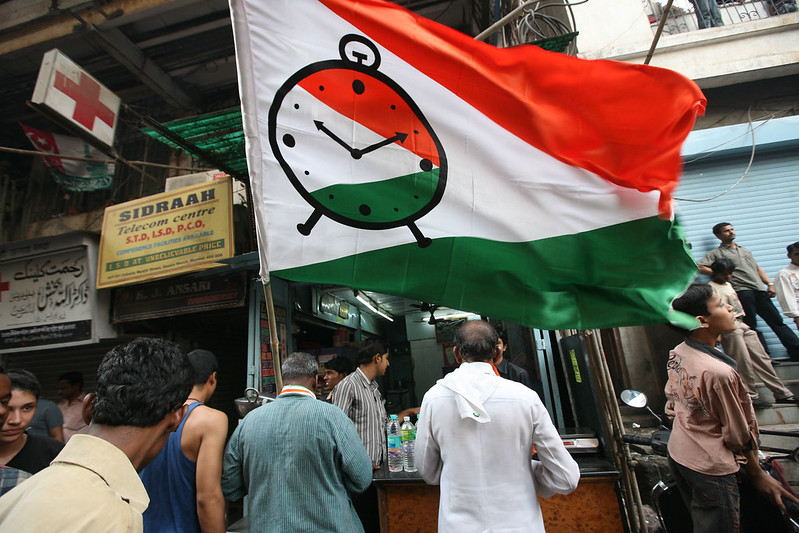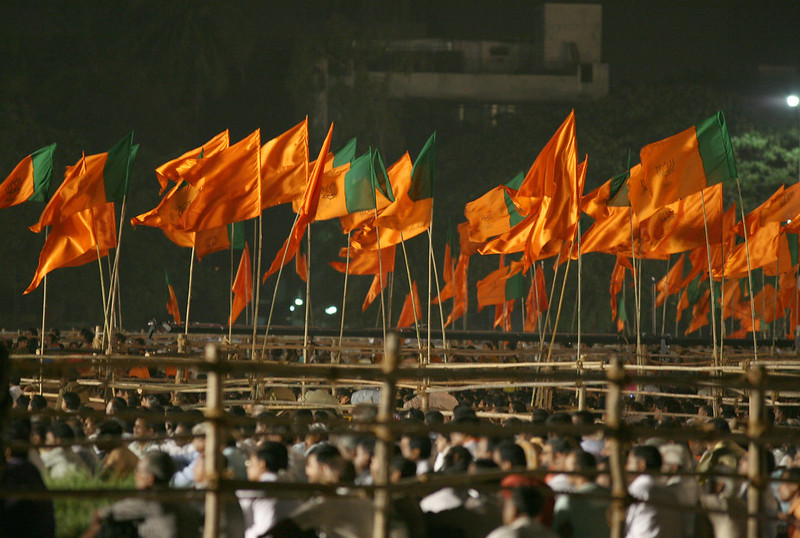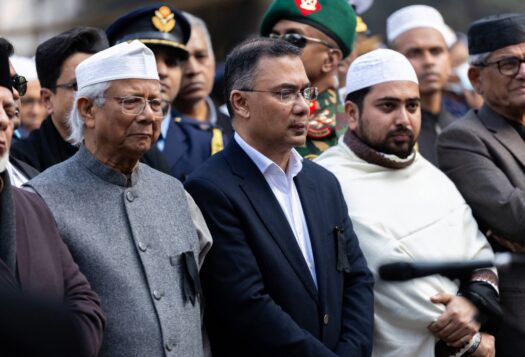
In 2004, the Bharatiya Janata Party entered Indian elections on a high, expecting to be brought back to power on the back of its first-ever five-year term in charge. Its campaign slogan was ‘India Shining.’ Opinion polls forecasted a comfortable victory. The party exuded confidence, but the results were a massive shock as the BJP was voted out and would spend the next decade on the Opposition benches of the Indian Parliament. It was a psychological rupture too: the ‘India Shining’ moment came to be seen as a parable of the dangers of hubris and overconfidence.
Exactly two decades later, the BJP has run headlong into a second ‘India Shining’ moment. With opinion polls and the popular narrative suggesting a BJP win as a foregone conclusion, Modi’s party went into the 2024 elections brimming with confidence. The BJP’s campaign was built entirely around the Prime Minister – its manifesto was titled ‘Modi’s Guarantee’ – and it called on voters not just to re-elect the party but to give it 370 seats (out of 543 in the bicameral Indian Parliament’s directly-elected house, the Lok Sabha).
After the final day of voting concluded, exit polls suggested that number was in sight – only to see all those projections fail when the score came in: just 240 seats for the BJP, 32 below the majority mark, and much lower than its 303 seats in 2019 and 283 in 2014. The BJP’s allies ultimately picked up enough seats for Modi to still have the numbers to return to power in a coalition government, but both his party and his reputation have been severely dented.
The BJP’s allies ultimately picked up enough seats for Modi to still have the numbers to return to power in a coalition government, but both his party and his reputation have been severely dented.
Election By The Numbers
For the first time in his electoral career, the Prime Minister was dependent on other parties to preserve his majority. More strikingly, the BJP dropped seats not just in non-Hindi speaking states like Maharashtra, West Bengal, and Karnataka, but also in the core ‘heartland’ state of Uttar Pradesh – India’s most populous state, often seen as a key staging ground of the BJP’s religious and language-based politics.
The BJP and its allies had won 72 and 64 of UP’s 80 seats in the last two elections, respectively. This time, they managed just 35 and remarkably fell behind the Opposition ‘INDIA’ grouping, which won 43. At the national level, the Congress-led INDIA bloc picked up 232 seats and 41.4 percent of votes, just a few percentage points away from the BJP-led NDA’s 44 percent.
While the BJP somewhat compensated for its losses by expanding into new territory in southern and eastern states, data suggests that the BJP’s vote share was reduced in 274 of 399 contested constituencies. Evidently, Modi’s star power, which fueled the BJP’s incredible rise and dominance in the last decade, has dimmed.
‘India Shining’ 2.0
It wasn’t just the narrative that the BJP had going for it ahead of the election but also that the playing field seemed heavily tilted in its direction. Modi’s party had an immense financial advantage over its competitors. Most of the mainstream media toed the government line and used airtime to attack the Opposition. Top Opposition leaders were arrested and jailed in the run-up to the elections, even as the BJP set about splitting other Opposition parties or convincing their leaders to jump ship.
The Opposition’s surprising success, despite those circumstances, explains why many in the INDIA alliance are celebrating despite Modi’s return to power. As several observers put it, though there may be continuity in government – and indeed, the portfolios for the new Council of Ministers and Cabinet display little change from the preceding line-up – the more impactful outcome was the “shattering of Modi’s aura of invincibility,” not least because referee institutions, like the Election Commission of India, might enjoy more space to assert themselves under a coalition setup.
In the immediate aftermath of the surprising results, the internet was filled with memes and commentary suggesting the BJP’s allies might act as a major check on Modi’s centralizing tendencies or his propensity for unilateral action – a reading that is now receiving some pushback.
Within the BJP there have always been concerns that the party’s fortunes might face a big dropoff in a post-Modi period. That the decline could come while he remains at the helm is now raising fundamental questions about whether India has already entered a new political era, a turn away from the BJP hegemony that many believed would be entrenched for years to come.
Win-win-win?
The Hindu’s Varghese George pointed out that, with caveats, everyone seems to be happy with these election results: Modi because he remains in power despite ten years of anti-incumbency, and Congress’ Rahul Gandhi because he has earned political legitimacy.
But it goes beyond just those two: “Centralizers and federalists/regionalists are happy. Religious nationalists and secularists are happy as well” and “the collapse of the fatalism associated with the supposedly inevitable victory of the BJP and Mr. Modi has,” in George’s view, even “empowered the BJP voter and its grassroots workers and leaders. They feel reassured that they cannot be taken for granted now.”
What about governance and policy priorities? One reading, common to those who track markets and the economy, is that there are “risks of a populist bias in the third term…potentially delaying tougher economic reforms.”

Yet curiously, there is a set of voices arguing that the mandate, which places checks on the BJP’s power while still maintaining at least a facade of stability and continuity, will lead to more robust outcomes – not just economic but also political and on the foreign stage. This does not just rely on the broad understanding that past coalition governments in India, defying the cliche of being messy and unwieldy, have quite a strong record of ushering in reforms.
Instead, the argument is even more specific than that. On foreign policy, C Raja Mohan argues that the results will reduce the pressure on Western governments to address questions about Modi’s authoritarian tendencies – allowing converging interests to take center-stage as the U.S.-China competition continues to heat up.
On the political economy front, Pranab Dhal Samanta suggests that “allies might actually act as guard rails for the next government to not detract from the huge economic task ahead of it.”Most curiously, the Prime Minister’s own Chief Economic Advisor saw positive signs in the BJP having a smaller contingent in Parliament. Speaking at an investors conference in Singapore, Anantha Nageswaran, referring to a number of policy matters lying in the hands of the states, claimed that “the election outcome increases the probability of some of these factor market reforms happening, rather than lowering it, because it creates avenues for dialogue and consensus building.”
Underlying each of these conclusions is an implicit assumption: that Modi and the BJP leadership will now approach governance in a more consultative manner. The party does not have an enviable record shepherding complex policies through Parliament, especially in its second term, choosing instead shock-and-awe methods that aim to stun the Opposition into submission. Since the results came out on June 4, the Prime Minister has yet to acknowledge his party’s reduced numbers or indicate that he will alter his approach to policymaking.
Nevertheless, the BJP does have senior leaders who could build bridges with alliance partners and even the Opposition and such efforts would make reforms more likely. However, the party’s heavily centralized structure offers little space for maneuvering, requiring them to constantly refer back to the Prime Minister’s Office.
For the government to derive the benefits of consultative governance that observers believe will make reforms even more likely, power will have to be fundamentally restructured and, to an extent, decentralized. However, there is no indication that Modi intends to do this – or that his party is capable of suddenly becoming consensus-builders.
Who’s to blame? (And who’s next?)
The post-results period also threw up a surprising indictment of Modi and his party, not in terms of the content, but because of its source. Rashtriya Swayamsevak Sangh chief Mohan Bhagwat appeared to admonish the party – albeit without naming names – in a speech. Bhagwat said that elections ought to be viewed as competition rather than war, that decorum was not maintained, and that a true servant of the people would not be arrogant.
The RSS is the ideological parent body of the BJP, and support from its leadership and rank-and-file is seen as a necessary condition for the party’s electoral success. There have always been rumors of the RSS’ discomfort with Modi despite the prime minister’s own deep ties to the organization. The reshaping of the BJP around a larger-than-life, near-divine image of Modi is usually cited as the reason for this rift, given the RSS’ preference for collective and ideological endeavors. That, however, has not prevented the RSS from working closely with the party over the last decade, including setting up “war rooms for coordination with BJP candidates” and “campaigning door-to-door” in the past.
Over the course of the 2024 election campaign however, there were suggestions that the rift might be deeper this time. Reports from UP claimed that the RSS was not active in the BJP campaign this time. Furthermore, the BJP president made the unusual claim in an interview that the BJP no longer “needs” RSS support.
In 2004, soon after the BJP’s dramatic and unexpected loss, former deputy prime minister LK Advani admitted that the ‘India Shining’ slogan may have been an error and that the “fruits of development” during his party’s tenure had not been equitably distributed.
In 2004, soon after the BJP’s dramatic and unexpected loss, former deputy prime minister LK Advani admitted that the ‘India Shining’ slogan may have been an error and that the “fruits of development” during his party’s tenure had not been equitably distributed. That year, the RSS reportedly did not campaign for the party.
2024 is not 2004, not least because the BJP remains in power. Few expect a major break between the two organizations. Yet Mohan Bhagwat’s criticism turns the spotlight on a key question: What lessons will the BJP take from this electoral setback, and what course correction is expected? Even as the party carries out a post-mortem and turns its attention to major state elections later this year, the other question that will start to bubble up as people begin to assess 73-year-old Modi’s third term as prime minister will be this: Who comes next?
Also Read: India’s Electoral Bond Conundrum
***
Image 1: Congress supporters campaigning door-to-door via Al Jazeera on Flickr
Image 2: BJP and Shiv Sena party flags via Al Jazeera on Flickr


